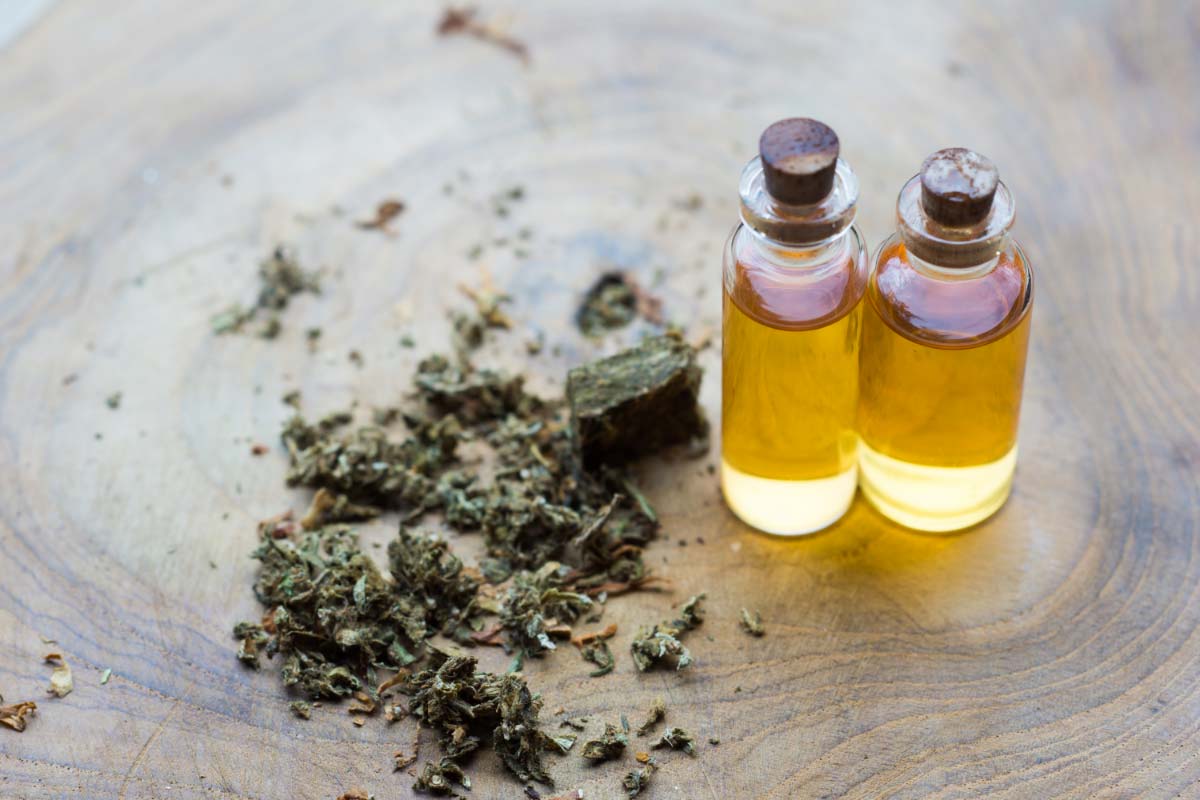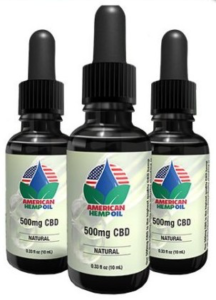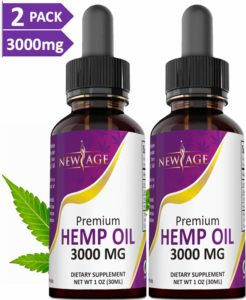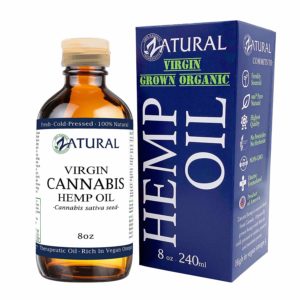CBD oil is an oil made from Cannabidiol, a chemical compound that is found in cannabis, and can be used to treat addiction and epilepsy. It is also used in some countries to help reduce pain in people with multiple sclerosis.
There are 113 cannabinoids that are present in cannabis, some like THC can impair cognition (get you high) while others can counteract this. CBD belongs to the latter group. A 2015 study by Iseger & Bossong demonstrated that CBD works as an anti-psychotic (1).
Best CBD Oil
1. American Hemp Oil
When compared to other CBD oils available on the market, American Hemp oil is superior in taste, quality, and effectiveness. Their CBD oil provides you with a potent dose of CBD derived from CO2 extraction flash chromatography, which removes the THC content from the source product and provides you with the a truly pure result.
American Hemp is extremely transparent in terms of their manufacturing process and their lab testing results. Their lab results can easily be located on the home page of their website and are listed by specific dosage amounts. For these reasons, it’s our #1 pick.
2. Genetics CBD Blood Orange

Genetics Blood Orange CBD oil stands out among the many products on the market because they have a clean product that also tastes amazing. This CBD oil has a blood-orange flavor that makes it great for people who are sensitive to strong aroma’s.
The purity of this CBD oil is excellent, and is further enhanced by the omega-3 and omega-6 elements.
3. EMPE CBD Oil Full Spectrum

EMPE CBD oil is all-natural and non-GMO certified that happens to be one of the highest-quality CBD oils available on the market. It’s also 100% THC free, making it a prime choice for many users.
Many users have also reported this to be an extremely fast-acting product as well for those looking for quick relief. EMPE CBD Oil also provides access to their lab testing results, ensuring its purity and commitment to quality.
4. Nutiva Organic Hemp Oil

Nutiva’s organic hemp oil is highly rated by users and comes in an opaque bottle that blocks out sunlight and avoids any detrimental effects caused by light exposure.
The all-natural and non-GMO distinction it carries is further bolstered by its USDA organic certification. You don’t have to worry about dangerous pesticides and chemicals contaminating this CBD product.
5. Manitoba Harvest Hemp Oil

Manitoba Harvest unrefined cold-pressed hemp oil provides omega 3,6, and 9 fatty acids bolstering the health benefits. It is completely free of flavorings or additives and manages to also avoid GMO ingredients.
For those looking for a product that is effective, inexpensive, and pure, Manitoba Harvest Hemp oil should be given considerable consideration.
6. Just Hemp Foods All Natural Hemp Seed Oil

Though it is not certified organic, this oil is comprised of pure cold-pressed and cold-filtered hemp seed oil making it truly pure and potent.
The container in which it comes also blocks out any available light, improving its potency and shelf life.
7. New Age Premium Hemp Oil
New Age’s premium hemp oil provides a large dose of CBD alongside omega-3 and omega-6 to give you the best possible health benefits. It also vegan-friendly, organic, and GMO-free, making it appealing for multiple lifestyles.
The extremely high satisfaction ratings among users also makes this a solid choice for those looking to get started in the CBD oil market.
8. Zatural Hemp Oil
Not only is Zatural Hemp Oil 100% THC-free, but it is also vegan, organic, and effective with omega-3 and omega-6.
Zatural is also so confident in their product that they offer a 30 day return policy if you’re unsatisfied for any reason, making it a safe bet if you’re unsure as to whether or not this product is for you.
9. Cultivax Hemp Oil
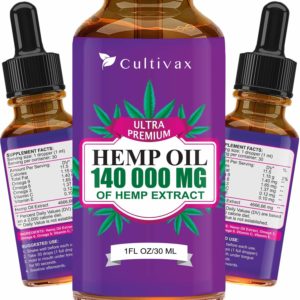
As the prime choice on Amazon, Cultivax CBD oil may not tout some of the features found in our higher placed products, but it does provide an effective and natural product that has a high success rate.
It not only provides omega-3 and omega-6, but it also provides vitamin E and vitamin C, rounding out its health benefits.
10. Dr. Adorable Hemp Seed Oil

Dr. Adorable has a reputation for providing pure and organic CBD oil and this product still provides exactly what users expect.
Though it is sold in a clear bottle which could cause minor deterioration in product quality, it is certified organic, non-GMO, and all-natural which partially makes up for that minor detail.
How We Rank
The first thing we looked at, when formulating our rankings of the best CBD oil, was purity. Products that were not 100% THC-free or contained questionable elements that affected the purity of the oil were left from the list. This is a primary reason that Wise Help’s hemp oil was not added to our rankings despite their popularity. Top brands such as American Hemp and Genetics Blood Orange CBD Oil were found to be free of contaminants or impurities that may have hindered the health benefits associated with the overall CBD product.
Next, we reviewed the potency of each product. Though this is generally hard to measure, we chose to look at elements such as lab testing and user reviews to find those that were the most successful in providing health benefits. CBD companies, like EMPE CBD Oil that provided third-party lab testing results often represent high-quality products that could be trusted.
Likewise, tests that revealed issues in terms of ingredients or content were taken into consideration when considering potency. Potent CBD oils contain an adequate dose of CBD without giving an amount that is too high or too low. CBD oils that claimed to provide doses that were not sustainable or turned out to be false based on the test results were removed from our rankings completely.
Lastly we looked at packaging. Because CBD oil can be damaged by light, companies, like Nutiva, that went the extra mile and used a dark bottle to protect it from light exposure, ranked higher. After all this, we determined the top 10 best CBD oils on the market.
Benefits
1. CBD oil can improve sleep. There is quite a bit of conflicting evidence as to whether CBD can improve sleep. A 1981 study found that insomniacs who took 160mg of CBD reported significantly better sleep than those who took a placebo (2).
There was also less dream recall (those who sleep well rarely remember their dreams the next morning).
A study in 2006 found that CBD increased wakefulness and alertness this could help people who feel drowsy throughout the day (3).
On the other hand, a 1977 study found that wakefulness was decreased in rats who were given cannabidiol (4).
It seems that THC has a sedative effect on the body, while CBD increases alertness. It is posited that a combination of the two could be used to complement each other (5).
Another study in 2014 found that taking CBD led to a significant reduction in REM sleep behavior disorder events in people suffering from Parkinson’s disease (6).
This disorder can affect anyone and involves sleep talking, kicking, punching, and screaming, also known as night terrors.
It seems that when it comes to sleep, CBD can help with certain disorders while having no effect on others. THC helps you to fall asleep, while CBD helps to regulate your sleep, and it seems to help you wake up fresher.
2. CBD oil reduces anxiety. There is a lot of evidence to support the notion that cannabis can reduce anxiety and a lot of people who suffer from anxiety self medicate with it. Many people assume that it is the THC that reduces anxiety, but numerous studies have demonstrated that it is CBD that actually helps.
A study in 1982 compared both THC and CBD and found that it was the CBD that led to a reduction in anxiety (7).
A more recent study in 2010 looked at the effects of CBD on people suffering from generalized social anxiety disorder (8).
The study found a significant decrease in subjective anxiety when compared to the placebo.
Another study found CBD was very effective at reducing anxiety in people suffering from social anxiety disorder who were about to perform a simulated public speaking test (9).
It would be beneficial to take CBD rather than THC before speaking in public, so this study could prove very useful.
A case report by Scott Shannon (2016) found that using CBD oil helped to reduce anxiety and to treat insomnia (strengthening the case for it being a good sleep aid) (10).
The study was looking at a ten year old girl who was suffering from PTSD, and it found that using CBD oil helped to improve focus, lower anxiety, and improve sleep. They found CBD was as effective as traditional pharmaceutical medication, but it came without any side effects.
A study on rats found that CBD worked in a similar way to Valium, when reducing anxiety during a test – called the Elevated Plus Maze. But only found it to work at certain dosages (11).
3. CBD oil may help prevent short term memory loss. While this may not be seen as a benefit as such, there is evidence that smoking marijuana that is high in CBD rather than in THC will prevent short term memory loss and cognitive impairment (12).
This could be beneficial for people who use marijuana medicinally but don’t enjoy the side effects. This comes back to cannabidiol being an anti-psychotic drug, and demonstrates why it is more suitable for consumption.
4. CBD oil may prevent seizures in Epilepsy sufferers. Anti epilepsy drugs have come a long way, and the ones that are currently available have been a huge improvement. But they are still not improving the standard of life for epilepsy sufferers. Because of this, many researchers have started looking at alternatives such as CBD oil (13).
A lot of research has looked at THC and the effects of medical marijuana as a treatment for epilepsy, but understandably not everyone likes the idea of using a psychotropic drug (14).
Considering that there is quite a lot of evidence that cannabis has many negative effects on developing brains, there is still some debate about whether young children should be using it, but as this 2014 study points out, the side effects are mild, while epileptic seizures produce a much larger effect (15).
An Israeli study on 74 patients (ages 1 to 18 years old) found that CBD treatment led to a significant reduction in seizure frequency (16).
In fact 26% of the patients reported a 75-100% reduction in seizures while taking CBD. The study also noted improvements in “behavior and alertness, language, communication, motor skills and sleep”. Not everyone was helped though, 5 of the 74 patients reacted very badly to it, and were withdrawn from the study.
While a lot of people would still rather take anti epilepsy drugs, that is not always possible. There are many sufferers who have treatment-resistant epilepsy, as such most methods don’t work. A study in 2015 found that cannabidiol helped to reduce seizure frequency in patients who were treatment resistant (17).
5. CBD oil works as an anti-psychotic. CBD has been shown to work as an antagonist to the psychotropic effects of THC, because of this a lot of studies are looking at it as an anti-psychotic, it may also be used to treat psychiatric disorders such as depression, and anxiety. It may also be effective at treating psychosis (18).
A study in 2015 found CBD to be “an effective, safe and well-tolerated antipsychotic compound” though cautions that larger scale studies are needed in the future (19).
6. CBD oil protects your brain. One of the scariest things about diabetes is loss of vision. This is where the blood-retinal barrier (BRB) breaks down. If left untreated it can lead to blindness.
One of the theories as to how this occurs is that neurotoxicity is to blame. A couple of studies have found that cannabidiol can help treat blood-retinal barrier breakdown, by working as a neuroprotective (20, 21). CBD may also protect the brain against neurological damage from strokes.
7. CBD oil suppresses inflammation in the brain. Both THC and CBD have been shown to reduce inflammation in the brain (called neuroinflammation). This may mean that they can be used as immunosuppressants and as an anti-inflammatory (22).
8. CBD may help lower cholesterol. There is a lot of conflicting evidence regarding CBD and cholesterol. Some studies have found it to reduce cholesterol, while others have seen a small increase or no difference. Some studies have found it to reduce HDL (good) cholesterol, while others have seen it reduce total cholesterol.
A study in 2013 found that taking cannabidiol led to a significant drop in cholesterol levels and in triglycerides in rats (23).
Obviously, a lot more studies are required before we can say whether CBD is effective at reducing cholesterol or not, but there are definitely some good signs.
9. CBD oil can help fight certain cancers. There has been lots of research looking at the effects of cannabis on certain cancers, with particular interest in CBD. A study in 2014 found that cannabidiol led to an inhibition of colon cancer cell growth (24).
This does not mean that CBD “cures” cancer, nor does it mean that it prevents cancer, just that it can slow down colon cancer cell growth.
One study found that non-THC cannabinoids can inhibit prostate carcinoma growth, while another found that CBD may help treat breast cancer (25, 26). There definitely seems to be some good evidence supporting the use of CBD in the fight against cancer, with a lot of studies supporting this. But it is early days, and there is definitely a need for more evidence.
10. CBD oil can help prevent nausea and vomiting. In 2002 a study found that CBD could suppress nausea in rats (27).
A further study in 2012 found that CBD suppresses nausea and vomiting by “indirect activation of the somatodendritic 5-HT1A autoreceptors in the DRN” (28).
DRN stands for dorsal raphe nucleus, which is found in your brainstem. The 5-HT1A autoreceptors are responsible for reducing anxiety, reducing depression, and prevention of nausea and vomiting.
11. CBD oil may help suppress your appetite. CBD oil became very popular recently when articles started popping up calling it a weight loss supplement. Anyone with experience of marijuana might be surprised to think of it as an appetite suppressant. In fact, medical marijuana has been used to help AIDS sufferers to put on weight, because it is such a powerful appetite stimulant (29).
But as you’ve probably noticed, CBD seems to work completely differently to THC and in fact seems to be a pretty effective appetite suppressant. There doesn’t seem to be too much reliable evidence that CBD is anything more than a mild appetite suppressant though, and it certainly isn’t a miracle fat loss supplement.
12. CBD oil can improve improve bone health from osteoporosis, may also reduce arterial plaque, and may also have an effect on rheumatoid arthritis (30, 31).
13. CBD oil may be an effective allergy treatment. As allergies plague many adults throughout the United States, the various treatments available have expanded to included both prescription and natural options. Though there are many choices available, many have started to search for more unorthodox means of allergy relief. While it has not been identified as a mainstream allergy treatment, CBD oil has shown considerable signs of being a successful course of treatment for those with environmental allergies.
According to a study in 2018 conducted on human skin cells, the occurrence of an inflammatory response to specific proteins and cultures was decreased at a rate of 20% when cannabinoids, including CBD were introduced into the sample. This is believed to have occurred due to the anti-inflammatory qualities found in CBD and its components. (1)
The human body exhibits an allergic reaction once it has come in contact with a substance that it identifies as a possible threat. In response to this exposure an inflammatory response occurs and presents itself in the form of a rash, hives, congestion, or other symptoms. CBD functions as an antagonistic neurotransmitter which helps to control and lessen these particular symptoms despite the associated causes.
Though this information is promising, there is a substantial need to explore the results and effects of CBD on allergies on a larger scale to measure its success as well as any long-term effects. If you are considering beginning a CBD oil centered course of treatment for allergies, it is highly recommended that you consult your physician first to ensure it is the best possible option for your specific needs.
Side Effects
1. CBD oil can cause tiredness. A review of cannabidiol found that the most common side effects of taking it were tiredness (possibly due to wakeful sleep), diarrhea, and changes in appetite (a lack of appetite rather than an increase). Other than that, the study found it to have virtually no other side effects (32).
The study does mention the need for more clinical trials though.
2. CBD oil may also cause diarrhea and weight loss. Just because there is a lack of dangerous common side effects, it does not mean that CBD is safe for everyone to use. As we saw in the Israeli study on epileptic children, out of 74 patients, only 5 suffered adverse side effects, but those 5 patients were severely affected by diarrhea, weight loss, fatigue etc (33).
Chances are that you will be absolutely fine taking CBD, but be sensible with it, and stick to the recommended dosage.
Recommended Dosage
2.5-15mg per day is optimal for general health, you can use between 2.5 and 20mg. If you are suffering from sleep disorders an intake of 40mg-160mg is ideal. You should experiment with the dosages to suit your needs.
In some studies you’ll see doses that are 10x as high as other studies (34).
Remember that a 100kg person and a 60kg person will be able to tolerate different doses, 40mg is only 0.4mg/kg for a 100kg person, while it is 1.5mg/kg for a 60kg person.
Always start at the lower end of the range, and work your way up slowly. If you begin to experience headaches, an upset stomach, or bad sleep then you should consider lowering the dose. If you are not noticing any changes then slightly increase the dose.
Luckily, the side effects of taking CBD are so minor that you have some room to experiment with doses. This is not true for medical marijuana as THC has some more serious side effects.
FAQ
Does CBD oil get you high? CBD oil won’t get you high because it has been specifically produced to minimize THC count (the stuff that gets you high) while maximizing CBD count (the stuff that actually prevents you getting high).
Does CBD oil help you sleep? CBD oil may help reduce anxiety, which is a major cause of insomnia. CBD induces alertness, but also appears to help increase overall sleep time at night.
How long do the effects of CBD oil last? The effects of orally administered CBD-rich cannabis oil can last for four hours or more.
Can CBD oil be taken while breastfeeding? No, it is not recommended that women who are nursing consume CBD oil. While the use of CBD oil during pregnancy has increased, the FDA and doctors have remained staunch in their recommendation to avoid the use of CBD oil while breastfeeding. This recommendation has been rooted in the possible transference of CBD and its components to the infant while nursing. Though there are THC-free products available on the market, the possibility for contamination or other compounds does exist which poses a risk to the nursing child.
How long does it take to feel the effects of CBD oil? The onset of effects is much slower than inhalation, usually around 30-90 minutes.
Does CBD oil thin your blood? Not directly, but it may increase the effectiveness of blood thinners if used in conjunction.
Does CBD oil make you hungry? CBD does not cause the same increase in appetite as THC because it does not bind directly at the CB1 receptor.
Can CBD oil be an effective acne treatment? Yes, CBD oil has been shown to be effective in the treatment of acne. Though its effectiveness can vary from person-to-person, CBD oils ability to treat acne stems from its effects on the creation of sebum. Sebum is produced by the skin and is both waxy and oily. If too much of this substance is produced, it can cause pore blockage and result in the production of cytokines. This inevitably leads to the production of acne. The anti-inflammatory properties exhibited by CBD oil helps to mitigate these occurrences and lessen the chances of episodes.
Does CBD oil cure cancer? No.
Is CBD oil safe to take while pregnant? In general, no, it is not recommended that pregnant women partake in CBD oil consumption while pregnant. Though many supporters of this practice have sited the absence of THC in pure CBD products, there are many uncertainties that exist in terms of birth defects or other effects that CBD consumption could cause while pregnant. If you are experiencing nausea or other symptoms you may believe can be resolved through the use of CBD oil, it is best to consult your OBGYN to explore all possible options and ensure you are well-educated on any possible side effects.
Does CBD oil expire? Yes it does. The best way to prevent and slow this down when it comes to a CBD oil is to store it in a cool, dark place. As such, the most common place to store CBD is in a fridge in between use.
Does CBD oil have THC? Though CBD does not contain THC, it is important to know a CBD product, such as tinctures, oils, edibles, etc., may contain some THC due to both compounds being present in the cannabis plant.
How should CBD be stored? CBD oil should be stored in a place that will prevent deterioration or breakdown of the product for as long as possible. Prior to opening, it is recommended that you store your CBD oil in a cool, dark place such as a pantry. This location should be free of light, heat, or moisture to avoid any detrimental effects on the product. After opening, it may be best to store your CBD oil in your refrigerator due to the steady temperature.
Is CBD, marijuana? CBD is often thought of as part of the medical marijuana umbrella, and is sometimes marketed as the same thing. You can buy food and drink products that are infused with CBD oil, though these are not nearly as common as THC infused products. While CBD does come from the cannabis plant (from the resin to be precise), it is not a psychoactive. This means that you will remain perfectly sober while taking it. In fact most cannabis plants are specifically grown to have as little CBD in as possible.
Is CBD found in the male or female cannabis plant? Cannabidiol is found within the female cannabis plant and has been largely overlooked by medical researchers and recreational growers.
Recap
Cannabidiol (CBD) is a cannabinoid that makes up the female cannabis plant. It differs from THC in several ways, most notably is that CBD is not a psychoactive substance. In fact CBD tends to limit the effects of THC, and as such is often considered as an anti-psychotic substance.
CBD appears to prevent short term memory loss in marijuana smokers, improve sleep quality, reduce seizures in epileptics, and is being considered as an alternative to current medical practice. CBD may also work as a neuroprotective agent, prevent temporary vision loss in Diabetics, lower total cholesterol, suppress inflammation, and fight different cancers.
Even though it is not a psychotropic drug, it is still classed as medical marijuana. As such it is illegal in many states in America, and many countries around the world. The UK, Japan, and the Netherlands allow it as a non-prescription drug, but in countries such as Australia, Canada (though this is set to change in 2018), China, France, Germany, and Russia it is still illegal (35).
For Healthtrends #1 CBD oil recommendation, click here.
